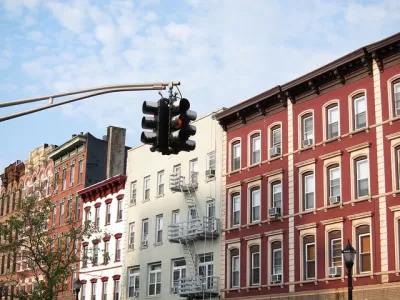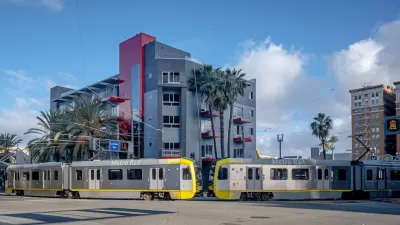In older, denser communities like Hoboken, NJ, where almost everything is walkable and land value is sky high, why are city officials still requiring parking minimums?

Andrew Price writes in Strong Towns about his frustration with the requirement that businesses in Hoboken, NJ are still required to provide a number of parking spaces, given the size, density and walkability of the city. Price argues that the space allocated for parking could be better use dto provide more housing.
…Hoboken is one of the few places in the United States where not owning a car does not feel like a hindrance. In fact, this was a major selling point for us, and probably for a lot of other people (because the rent is incredibly high which signifies that there is a lot of demand to live here.)
What was the discussion going on in city hall when they thought this was needed? Is it to compete with the suburbs? Real estate prices in Hoboken are extremely high, a sign that there is huge demand to live here. I chose to live here because it is not suburban, so why would we adopt policies that make our city more suburban? Why do we adopt ordinances that make most of our city's character illegal if we were to develop it from scratch today?
Doing some rough estimations on the cost to provide parking in Hoboken, Price notes that the cost to house a car (in a typical parking stall) is about $812.50 per month "if housing a car per square foot matched housing a person." In a city where affordable housing is desperately needed, Price asks why it should "cost a person 108x (per square foot) to house themselves over their car?"
FULL STORY: My Car Pays Cheaper Rent Than Me

Planetizen Federal Action Tracker
A weekly monitor of how Trump’s orders and actions are impacting planners and planning in America.

Maui's Vacation Rental Debate Turns Ugly
Verbal attacks, misinformation campaigns and fistfights plague a high-stakes debate to convert thousands of vacation rentals into long-term housing.

San Francisco Suspends Traffic Calming Amidst Record Deaths
Citing “a challenging fiscal landscape,” the city will cease the program on the heels of 42 traffic deaths, including 24 pedestrians.

Defunct Pittsburgh Power Plant to Become Residential Tower
A decommissioned steam heat plant will be redeveloped into almost 100 affordable housing units.

Trump Prompts Restructuring of Transportation Research Board in “Unprecedented Overreach”
The TRB has eliminated more than half of its committees including those focused on climate, equity, and cities.

Amtrak Rolls Out New Orleans to Alabama “Mardi Gras” Train
The new service will operate morning and evening departures between Mobile and New Orleans.
Urban Design for Planners 1: Software Tools
This six-course series explores essential urban design concepts using open source software and equips planners with the tools they need to participate fully in the urban design process.
Planning for Universal Design
Learn the tools for implementing Universal Design in planning regulations.
Heyer Gruel & Associates PA
JM Goldson LLC
Custer County Colorado
City of Camden Redevelopment Agency
City of Astoria
Transportation Research & Education Center (TREC) at Portland State University
Jefferson Parish Government
Camden Redevelopment Agency
City of Claremont





























